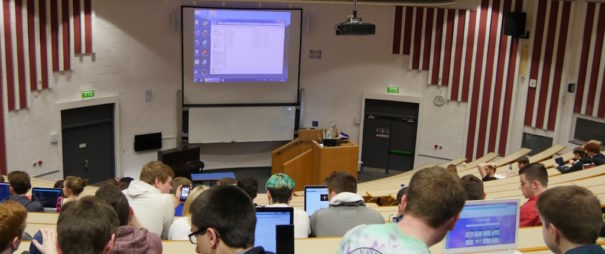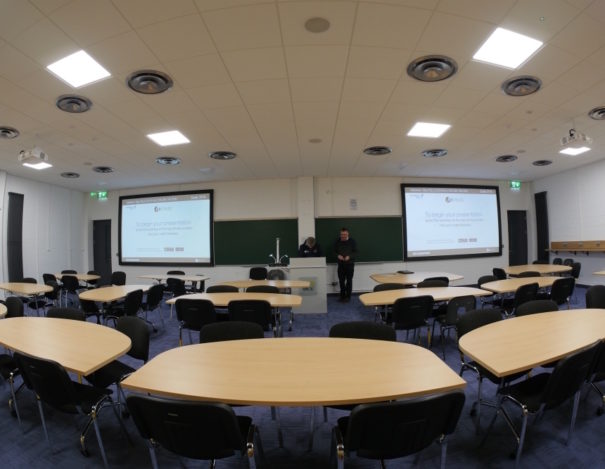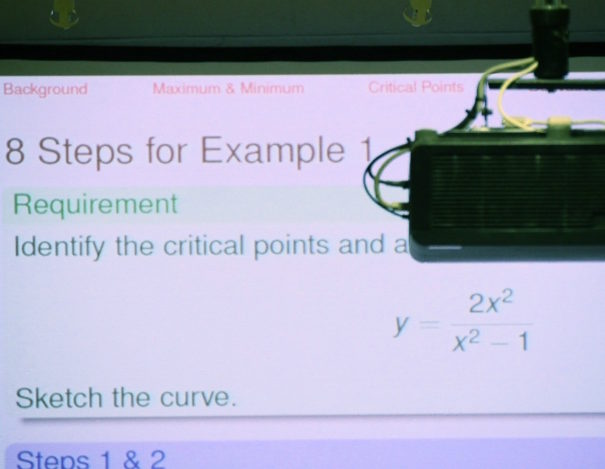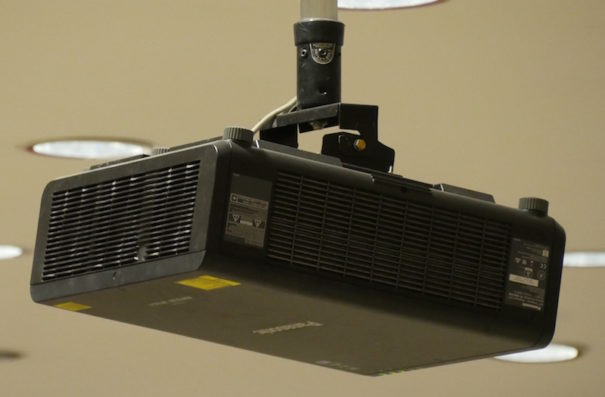La proyección láser marca el camino de la transformación audiovisual en la DCU
La Universidad de la ciudad de Dublín se ha embarcado en un proyecto de modernización tecnológica, que incluye el despliegue de proyectores láser de Panasonic, junto con Crestron DM, para cada uno de los espacios de enseñanza.
El proyecto de digitalización de la Universidad de la ciudad de Dublín (DCU) en colaboración con Panasonic forma parte de una inversión de 200 millones de euros en un nuevo campus para la capital irlandesa.
En el núcleo de esta asociación se encuentra la tecnología de proyección láser de este fabricante, hasta el punto que a finales del pasado año ya se habían instalado más de 150 proyectores láser, junto con la plataforma Crestron Digital Media, en cada uno de los espacios de enseñanza de los tres campus.
Esta combinación responde al pliego de licitación de equipos fiables, con bajo mantenimiento y que resulten sencillos de utilizar para el usuario, por lo que se optó por el proyector Led/láser de la gama Solid Shine PT-RW330 (de 3.500 lúmenes) de Panasonic para las salas de seminarios, mientras que para las aulas de mayor tamaño, se eligió el modelo totalmente láser PT-RW630 (de 6.500 lúmenes) de este fabricante.
Así lo señala Declan Raftery, director de operaciones de la DCU: “tenemos más de 140 aulas y espacios de enseñanza distribuidos en tres campus. Hasta ahora habíamos utilizado tecnología halógena antigua y queríamos sustituirla. La tecnología láser que ofrece Panasonic es atractiva por su calidad, extremada durabilidad y reducidos costes de mantenimiento. Desde el punto de vista de la universidad, representa una reducción sustancial del coste total de propiedad”.
Igualmente, los comentarios de los profesores con el cambio de tecnología audiovisual “ha sido también muy positiva, ya que hasta ahora su calidad había sido siempre motivo de queja -explica Raftery-. A veces, entraban en un aula a primera hora de la mañana y una lámpara se fundía, lo que causaba retrasos en la clase. Ahora avanzamos hacia una situación en la que los docentes confían en la tecnología, saben que funcionará y que ofrecerá alta calidad en todos los espacios de enseñanza”.
En la misma línea, los estudiantes también señalan que la nueva tecnología audiovisual les permite aprender mejor, ya que con la anterior había muchos fallos en el funcionamiento de los proyectores. “Resultaba frustrante llegar a clase y encontrarse con que el profesor no podía utilizar la tecnología, algo que ahora no sucede con la nueva tecnología, mejorando la experiencia en el aula”, asegura Kim Sweeney, presidende de la asociación de estudiantes de la DCU.
La compañía irlandesa McKeon Group ha sido la adjudicataria del contrato para actualizar las tecnologías audiovisuales de la Universidad de la ciudad de Dublín y está sustituyendo gradualmente los sistemas de todos los espacios de enseñanza de esta institución académica por la nueva plataforma digital.
“Dada la situación económica de Irlanda, ha resultado muy difícil convencer a los clientes que cambiar a la tecnología láser resulta a la larga más rentable -apunta Tomás Mac Eoin, director general de McKeon Group. Por ello, organizamos una competición con proyectores láser de Panasonic y varios rivales basados en lámpara, y les batimos con creces”.
Según los términos del proyecto, la compañía ha firmado un contrato marco de tres años para actualizar todos los espacios de enseñanza al mismo estándar, “que debemos instalar en función de los horarios de las clases. Una vez completado el trabajo, las instalaciones podrán compararse con las de las mejores instituciones educativas de Irlanda”, asegura este directivo.
Para William Kelly, decano de la DCU, “es muy importante contar con un campus digital del siglo XXI y que los equipos audiovisuales se hayan modernizado con tecnología puntera. Las expectativas de los estudiantes se basan en su propia experiencia personal de acceso prácticamente instantáneo a la tecnología. Ahora nos acercamos a la idea de una clase al revés, en la que los estudiantes aprenden gran parte de la materia fuera de las clases formales, y el aula se convierte mucho más en un espacio de colaboración. Es muy importante en este contexto que tanto los profesores como los alumnos puedan traer material digital y que la tecnología garantice su funcionamiento”.
Te gustó este artículo?
Suscríbete a nuestro RSS feed y no te perderás nada.
• Sección: Casos de estudio, DESTACADO, DESTACADO Caso Estudio, Formación, Proyección


















